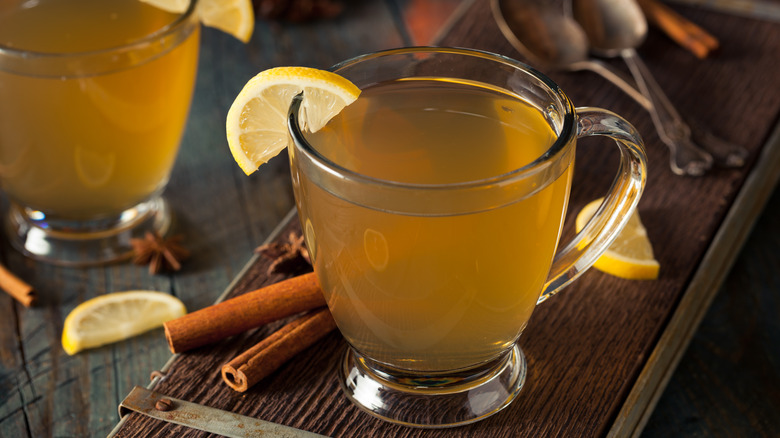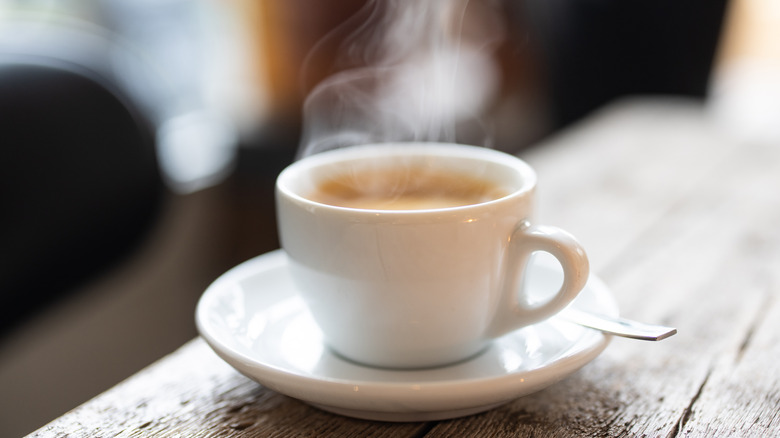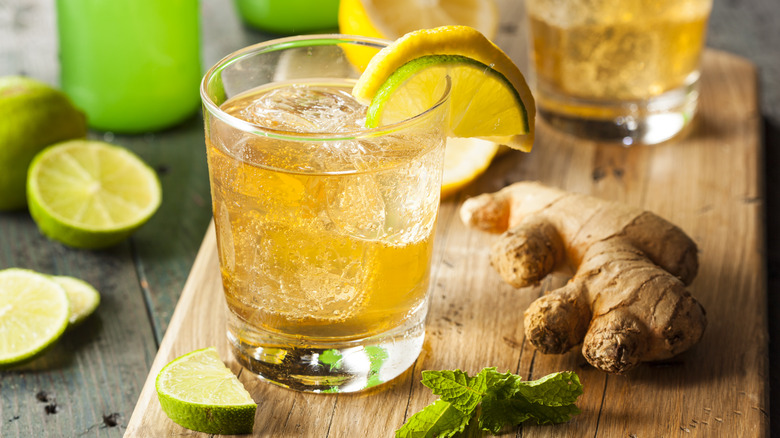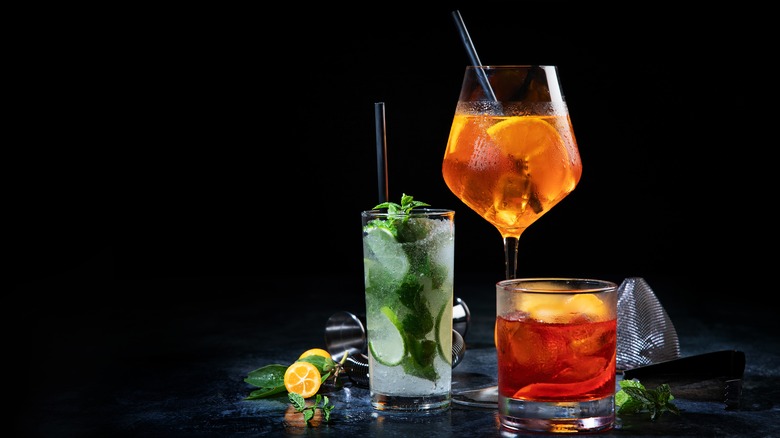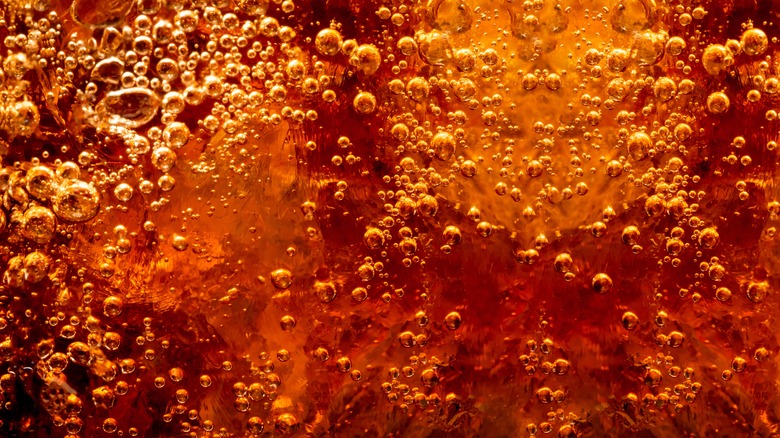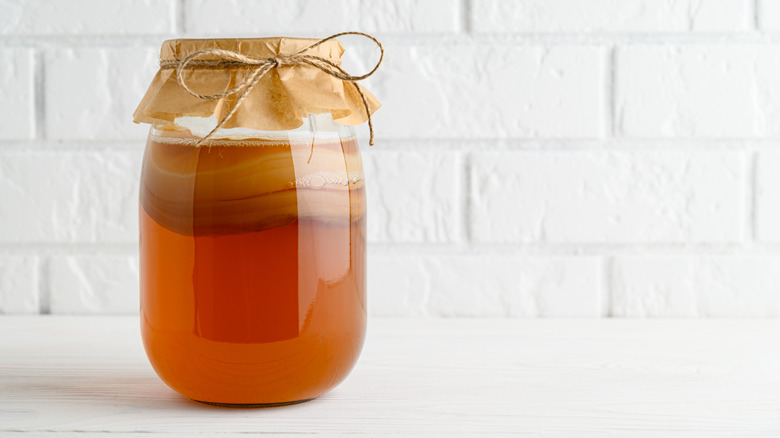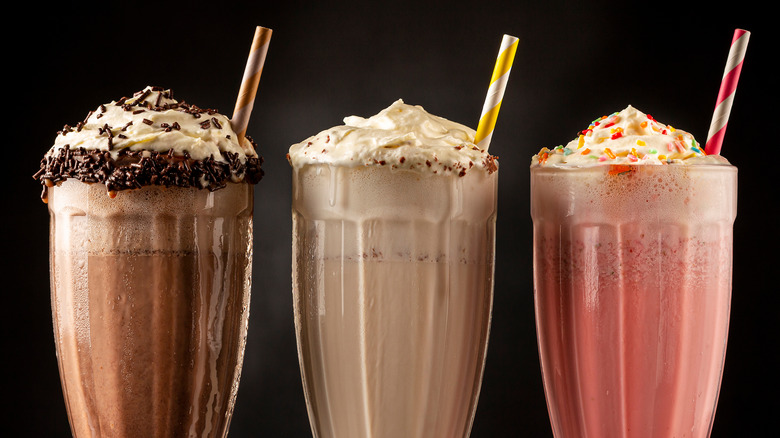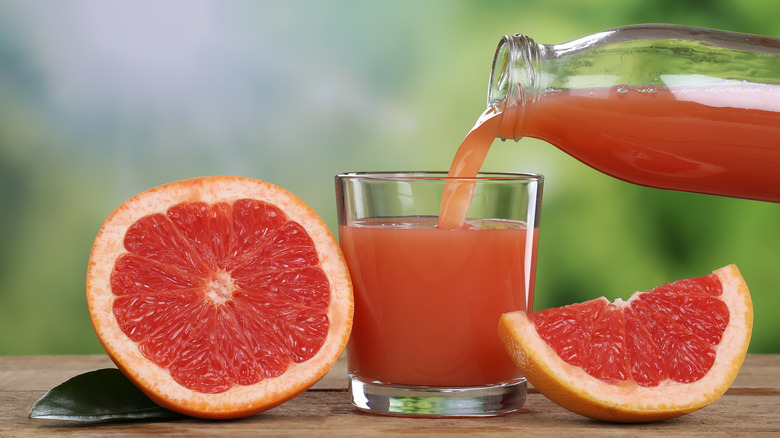The Worst Drinks To Consume If You Have A Common Cold
True or false: There's only one type of virus that causes colds. If you guessed false, you're right. According to the Cleveland Clinic, there are actually more than 200. And fun fact (or maybe not so fun fact): we call it the common cold because most people catch these infections — and often multiple times in a single year.
Given that colds affect the nose, the throat, the sinuses, and the windpipe, it's no wonder they cause symptoms like scratchy throats, sneezing, and coughing (per Mayo Clinic). And since they are infections, it's not surprising that they often cause a fever (albeit typically a low-grade one). But what might surprise you is that you probably won't show symptoms of a cold until one to three days after you've come in contact with one of the many viruses that cause colds. If you start to experience more serious symptoms (like a fever that's higher than 101.3 degrees Fahrenheit and remains high for more than three days), you should seek medical help.
Even if you only have a mild cold, it's still important to take proper care of yourself so that you can recover as quickly as possible. This includes making the best choices when it comes to what to drink. With that said, you may want to check with a health care professional about your cold recovery meal plan; even drinks often thought of as beneficial for colds might have some noteworthy downsides, depending on your circumstances.
Hot toddy
As Forbes explains, the basic ingredients of a hot toddy are honey, lemon, hot water, and whisky. Of course, there are more modern variations, but in general, the hot toddy is considered by some as a "home remedy" for the common cold. However, there are some potential downsides to this warm beverage.
To be fair, hot toddy's reputation as a "treatment" for the common cold isn't completely unearned. The drink is touted as a soothing beverage that helps decongest cold patients. As Ginger Hultin, spokesperson for the Academy of Nutrition and Dietetics, told USA Today, the fact that hot toddies are hot is one reason why they help cold patients feel more relaxed. She also notes that the honey might also be beneficial. But the drink has a major strike against it – its alcohol content. Alcohol can not only negatively affect one's immune system, but also be potentially unpleasant for one's throat. And even though technically a person is taking in liquids when they drink a hot toddy, alcohol can make one dehydrated.
If the soothing nature of hot toddies still sounds appealing, there is an alternative. Dr. Eric Ascher, a doctor of family medicine, says that cold patients can take the honey and lemon normally used in a hot toddy and put them in a hot herbal tea instead. This way they can get the soothing, decongesting aspects of a hot toddy without the alcohol.
Coffee
If you do an Internet search, you'll find some conflicting information about coffee and the common cold. There's even a study published in the Journal of Psychopharmacology that found that coffee might offer some benefits to someone with a cold. In fact, one of the biggest debates about this beverage centers around its caffeine content.
The American Lung Association advises against drinking coffee if you have the common cold because it has caffeine. The Mayo Clinic explains that caffeine is a type of diuretic, and so it causes the body to make more urine. The concern (as the Association states) is if a person consumes caffeine, they'll become dehydrated, which will make it harder for their body to recover from a cold.
With that said, when a person drinks coffee, they are consuming both fluid and caffeine. The Mayo Clinic notes that the beverage's fluid content might basically cancel out the potentially dehydrating aspect of the caffeine. Still, the amount of caffeine, as well as if the individual regularly consumes caffeine or not, are factors to take into consideration. The Clinic also warns that the caffeine in coffee "can temporary raise blood pressure." Plus, coffee loaded with unhealthy ingredients like sugar isn't a good idea, especially if you have a cold. Ultimately, if your goal is to keep yourself hydrated, opting for water instead of a beverage containing caffeine is probably best.
Ginger ale
Ginger ale is another beverage that's associated with helping you feel better when you're sick. It can help with stomach issues like nausea, as well as help one stay hydrated (via Nao Medical). It may also help ease a sore throat, albeit temporarily. But there are some major potential strikes against this popular beverage. For one, as WebMD notes, ginger ale can contain sugar. In an interview with The Healthy, Dr. Irvin Sulapas explains that sugar can suppress the immune system and cause inflammation, which can interfere with the body fending off a cold.
Okay, but wouldn't its ginger content make up for the sugar? After all, as Nao Medical explains, " ... ginger has anti-inflammatory and immune-boosting properties." Sadly, just because a particular product is called ginger ale doesn't mean it has real ginger in it. And even if it does, it might not have very much of it. So, while ginger might help with inflammation, that doesn't guarantee a specific brand of ginger ale will.
Still, just because ginger ale has some notable drawbacks doesn't mean ginger is off a cold recovery menu. For example, you can put ginger in hot tea (per WebMD). This way, you can get the full benefits of actual ginger, as well as the soothing qualities of a hot beverage. Plus, you'll control all the ingredients, meaning you can not only make it with no sugar, but also control the amount of ginger to meet your tastes and needs.
Alcohol
Drinking alcohol when you're sick with a cold can be a bad choice for a number of reasons. For example, WebMD explains that if you have a cold and a headache, drinking alcohol could make that headache more severe. Alcohol is dehydrating and could weaken one's immune system. This occurs because alcohol can impact the good bacteria in the intestines, which in turn can negatively affect the immune system (per GoodRx).
In addition, alcohol can interact with medications commonly taken to treat colds. These include Nyquil, where alcohol can exacerbate possible side effects of the medicine, like dizziness. Also, alcohol should be avoided if you're taking pain relievers. Alcohol and an excess of acetaminophen (like Tylenol) in your system could harm your liver. Additionally, you shouldn't consume alcohol if you're taking ibuprofen (Advil or Motrin) or naproxen (Aleve) because you could develop stomach ulcers. The bottom line is that as long as you have a cold and/or are on medication(s) for your cold, even a little alcohol is not advisable.
Check with a health care professional about the medications you're taking. You can also contact Poison Control Centers at 800-222-1222 with specific questions about medications. And in case of a medical emergency, don't hesitate to call 9-1-1.
Sugary caffeinated soda
While there are a wide variety of beverages that fall under the umbrella of sodas, we're going to focus on the ones that contain sugar and caffeine. As Dr. Irvin Sulapas, an assistant professor of sports medicine at the Baylor College of Medicine in Houston, Texas, told The Healthy, a major concern is that the caffeine content in some sodas will lead to dehydration and make it more difficult for a cold patient's body to heal and recover.
There is debate about whether the fluid in drinks like soda offsets this aspect of the caffeine (via Mayo Clinic). Moreover, the amount of caffeine can be a factor. Let's note the caffeine levels for two of the best-known cola brands on the market: Coca-Cola and Pepsi. According to the University of Utah Math Department, 12 ounces of Pepsi-Cola contain 37.5 milligrams of caffeine. Meanwhile, the same amount of Coca-Cola Classic has 34 milligrams of caffeine.
In addition, UCLA notes there's research supporting that sugar found in sodas (as well as other types of drinks) can have an unhealthy impact on one's body. Lastly, sugar causes inflammation in the body — and when your body is trying to defend itself from an infection like the cold, inflammation is the last thing it needs.
Kombucha
As the Mayo Clinic explains, kombucha (also called kombucha tea) is more than just a tea drink that contains sugar. It is a fermented drink that has bacteria and yeast. But while this beverage has been touted for its potential health benefits, there are a few reasons why you might want to pass it up if you have a cold.
For one, there's currently not a great deal of research to back up kombucha's possible benefits when it comes to one's health. Another reason why kombucha might be a bad choice for someone with a cold is because it contains histamines (per ABC7). According to the Cleveland Clinic, histamines are chemicals that come from your immune system which can cause issues like nasal congestion, headaches, migraines, and fatigue. In addition, drinking kombucha might upset one's stomach.
Furthermore, it's possible to have an allergic reaction to kombucha (per Mayo Clinic). Infections have also been associated with the beverage. And how one makes kombucha can actually make the drink dangerous: Brewing it in "unclean conditions" can increase the chances of unhealthy bacteria being in the drink. Plus, ceramic pots sometimes used for kombucha can contain lead, which can contaminate the kombucha and cause lead poisoning. All in all, it's probably best to stick to hot herbal tea when you have a cold.
Milkshakes
When you have a cold — especially if you have a sore throat along with it – milkshakes (which are made of ice cream) can sound like a nice treat. Indeed, drinking something cold and creamy if your throat hurts seems to make sense. But milkshakes have some notable strikes against them as far as the common cold is concerned.
You might be thinking that it's the milk in milkshakes that's the issue. After all, as NDTV points out, it's believed by some that drinking milk leads to the body making more phlegm. There have even been studies done about a possible milk/phlegm connection, but with varying results. But while there's debate about milk and colds, nutritionist Dr. Rupali Datta told NDTV that cold dairy products such as ice cream "should be avoided as they irritate the stomach and throat."
If you have a sore throat, the University of Michigan recommends staying properly hydrated with beverages like water and hot herbal or decaf tea with honey and lemon. Broths and soups can also be helpful. Additionally, you might want to try gargling three times a day with salt water. Just make sure the water is warm and that you only gargle for a few seconds before spitting it out.
Grapefruit juice
As the U.S. Food and Drug Administration (FDA) notes, while grapefruit has healthy properties, it can interact with different medications. These include both prescription drugs as well as over-the-counter (OTC) ones. Unfortunately, that means grapefruit juice can be off the menu if you're taking certain medications to help treat the common cold.
According to Hudson Physicians, the antihistamine Allegra is sometimes recommended for cold patients. The FDA cautions that Allegra (also known as fexofenadine) can interact with grapefruit juice. Specifically, having both grapefruit juice and fexofenadine in your system could weaken the drug's effect. This is because Allegra needs to enter the cells of the body, but grapefruit juice can prevent that from happening. It's worth noting that not all antihistamines have this kind of interaction with grapefruit juice. Plus, there are other factors to consider, like how much grapefruit juice is consumed. Plus, it's possible for one person to be more affected by a grapefruit juice/drug interaction than another person, simply because everyone is different.
Additionally, if you're advised to avoid grapefruit juice while taking certain medications, you might want to avoid pomelos, Seville oranges, and tangelos (per FDA). These fruits also have the potential to interact with your medications. Make sure to consult a health care professional about any medications you're taking when you have a cold, as well as any food and/or drug interactions you should know about.

